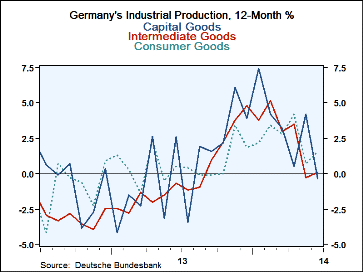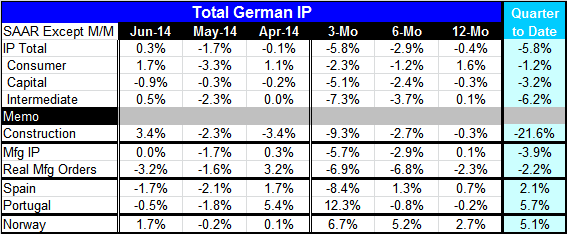 Global| Aug 07 2014
Global| Aug 07 2014German Industrial Output Makes Weak Rebound
Summary
Industrial production in Germany in June rose by 0.3%, only partly restoring May's 1.7% drop. German industrial output is falling over three months and six months. The pace of decline is gathering steam over shorter horizons. All [...]
 Industrial production in Germany in June rose by 0.3%, only partly restoring May's 1.7% drop. German industrial output is falling over three months and six months. The pace of decline is gathering steam over shorter horizons.
Industrial production in Germany in June rose by 0.3%, only partly restoring May's 1.7% drop. German industrial output is falling over three months and six months. The pace of decline is gathering steam over shorter horizons.
All three sectors of German industrial output are showing accelerating drops in output from 12 months to six months to three months. Output is not just dropping; its drop is accelerating even with the June IP rebound.
This pattern of decline has spread to construction as well, as output's drop is accelerating.
Both manufacturing and real manufacturing orders show this same accelerating drop in sequential growth rates. Manufacturing IP increased by 0.1% over 12 months, but on shorter horizons growth rates show declines that accelerate to a -5.7% pace over three months. Real manufacturing orders fell by 2.3% over 12 months and that drop accelerates to -6.9% over three months.
None of the early IP reporters in Europe show such clear trends in IP. Spain's IP has no pattern, but it is dropping at an 8.4% annual rate over three months. Portugal's IP declines over six months and 12 months, but is up by a hearty 12.3% pace over three months. Norway shows progressive positive acceleration in output, quite the opposite of Germany.
In the quarter to date for a calculation now covering the second quarter, we see declines in German IP and declines in each of the German sectors as well as construction. Manufacturing IP in Germany is dropping at a 3.9% pace while real manufacturing orders are off at a 2.2% pace. Spain, Portugal and Norway each show solid increases in the quarter.
There is not much evidence as to why Germany is slowing as it is. But there is a lot of speculation that the sanctions on Russia and lost business in Russian trade are at the bottom of it. It is particularly odd to see the most competitive country in the euro area weakening ahead of fellow members. This suggests that it may be a loss in business by Germany in regions that the others do not have as much trade with. There are scattered reports of lost German business in Russia. Today there is a report that the airport in Frankfurt is suffering weaker revenues because of the lack of flights to Russia. The Russian connection seems the best bet to explain Germany's slowing, but we don't have the data to prove it yet.

Robert Brusca
AuthorMore in Author Profile »Robert A. Brusca is Chief Economist of Fact and Opinion Economics, a consulting firm he founded in Manhattan. He has been an economist on Wall Street for over 25 years. He has visited central banking and large institutional clients in over 30 countries in his career as an economist. Mr. Brusca was a Divisional Research Chief at the Federal Reserve Bank of NY (Chief of the International Financial markets Division), a Fed Watcher at Irving Trust and Chief Economist at Nikko Securities International. He is widely quoted and appears in various media. Mr. Brusca holds an MA and Ph.D. in economics from Michigan State University and a BA in Economics from the University of Michigan. His research pursues his strong interests in non aligned policy economics as well as international economics. FAO Economics’ research targets investors to assist them in making better investment decisions in stocks, bonds and in a variety of international assets. The company does not manage money and has no conflicts in giving economic advice.
More Economy in Brief
 Global| Feb 05 2026
Global| Feb 05 2026Charts of the Week: Balanced Policy, Resilient Data and AI Narratives
by:Andrew Cates






